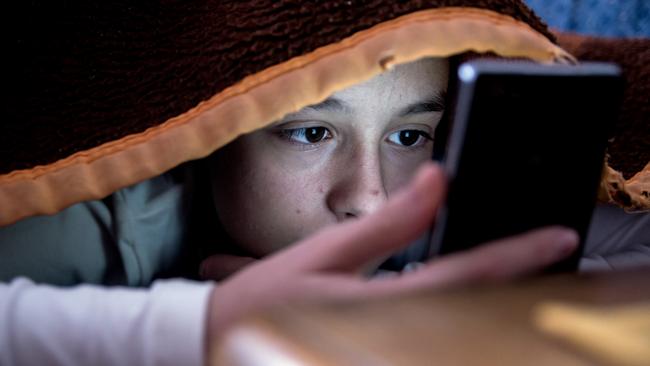The risk to our children of device addiction
Are digital devices the new cigarettes? Slotted in between children’s fingers just as neatly, and possibly just as addictive.
Opinion
Don't miss out on the headlines from Opinion. Followed categories will be added to My News.
Digital devices are the new, fashionable babysitters. They allow busy parents a few minutes’ peace, or time to power through heaving to-do lists.
These digi-besties are acceptable guests at cafes, in airport lounges, cars and on planes. These are handy, transportable distractions — easier than calming tantrums.
Suddenly teens arrive with no interest in face-to-face conversation. My friend said of her son: “It’s totally different to when I was growing up. He’s not interested in playing outside; has no concentration, is easily distracted and needs to be constantly entertained by his screen. No more climbing trees for kids.”
Nope, no more grazed knees; life is viewed through filters now.
Many heads are buried deep in denial about digital. There’s rumbling chatter about what this brave new techno world is doing to kids, teens, and a generation of young adults. However, this is uncharted territory. No one really knows the long-term harm of spending long periods on devices. Someone should care. Who?

Hashtags and advertising campaigns can’t bring back Amy “Dolly” Everett, the face of Akubra, who took her life at just 14 years of age. Bullies have been given a key to the backdoor after school.
At the same time the spotlight is thrown once again on to cyber-bullying. It’s reported two major shareholders of Apple wrote a letter asking the company to study negative effects of smartphones and create ways for parents to restrict access. Collectively, these stakeholders control $1.48 billion in Apple stock.
“There is a growing body of evidence that, for at least some of the most frequent young users, this may be having unintentional negative consequences,” the shareholder’s letter said, according to the Wall Street Journal, adding an Apple spokesman declined to comment.
Well, why would they respond? Where’s the dizzying dollar KPI incentive in that?
“There’s your hotspot, here’s the gender-neutral bathroom, don’t question the consequences, we’re here to innovate” — surely, that’s day one briefing on the techno block?
Yes, there are already some technical hoops to jump through such as the “Ask to Buy” feature that slows down giddy kids with nimble fingers and imaginary bank accounts. But should they go further?

Activists who insist tech giants should take more responsibility for addictive devices they unleash will certainly have a battle on their hands.
Business is roaring, funds are flowing, growth is off the charts, these are the innovation waves capitalists dream of catching.
Here are the new cigarettes, slotted in between fingers just as neatly, and possibly just as addictive. The last thing tech companies want is to slow down the burgeoning, swelling snowball. Boo hiss to accountability.
Facebook is as slippery as soap at every point around responsibility. Rising online abuse and concerns about Facebook Live are soaring. There has been a 63 per cent increase in complaints about cyber-bullying over the past year.
Meanwhile, Facebook has refused to disclose how many staff monitor content for abuse in Australia or disclose how much material is reviewed by actual breathing human beings rather than an automated process.
It’s no secret firms such as Apple and social media platforms such as Facebook are good at avoiding tax too. In April last year Facebook Australia restructured local business and was forced to count its ad revenue after the Turnbull government’s reforms.

Do tech giants care about the community? Do they care about the impact these devices are having on children’s mental health or long-term effects?
Come on, glance at the tobacco ind-ustry. Peek at the sugar industry. Look at the alcohol industry, which undeniably fuels violence on our streets and in our homes, yet it’s as socially acceptable as data.
Last year, former Apple executive Tony Fadell said Twitter was addictive. “Apple Watches, Google Phones, Facebook, Twitter, they’ve gotten (sic) so good at getting us to go for another click, another dopamine hit,” he wrote on Twitter. Dopamine is a chemical that makes you sort of high and happy. Dopamine pathways play a major role in reward-motivated behaviour. Certainly, this is behind addiction.
Who is considering that feeding this to growing minds may well cancel out the daily goodness of the five-a-day vegetables conscientiously consumed?
Relying on business or government to legislate will be too little, too late. Their business is the gravy train, running on arrogance. It’s naive to believe either really care about individuals. Their language is of huge profit, sweeping statements and vote-winning policies. They do not care about everyday people’s real lives.
Call yourself progressive and you’re given a silent customs waiver.
Progress — we all want that, don’t we? At what cost? Who’s responsible for the risk assessment? And damages? Responsibility for your own life always sits within your own hands.
Remember when Uber confidently pulled up at the scene promising marvellous disruption?
If only humans could learn that grass is merely a different shade of green.


